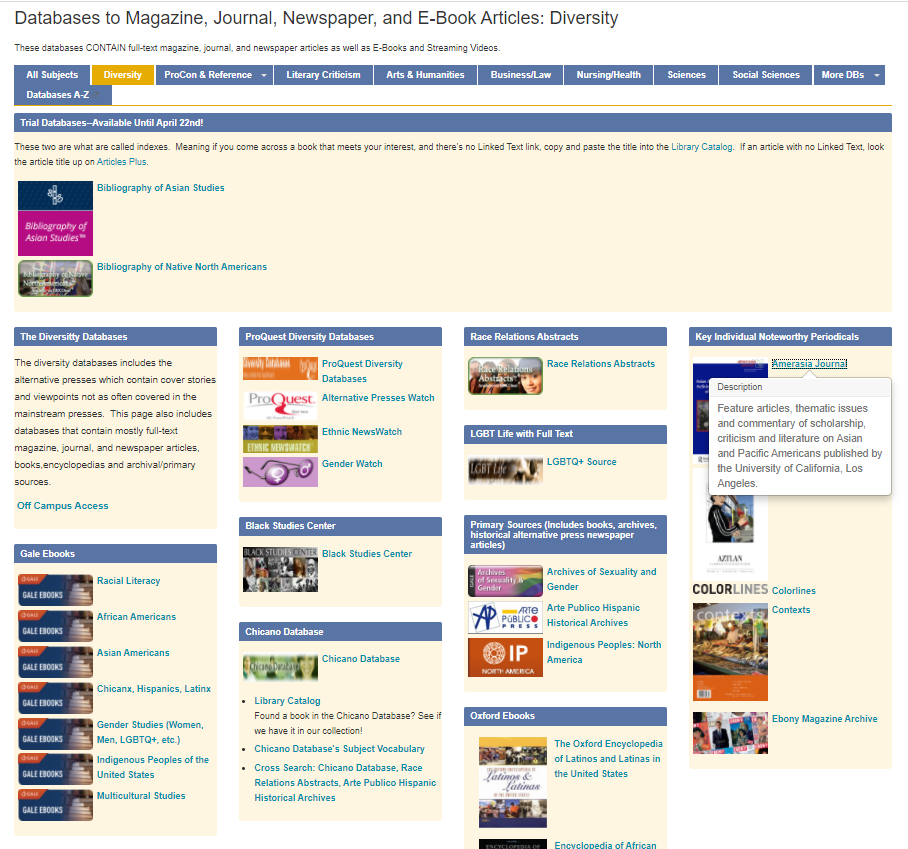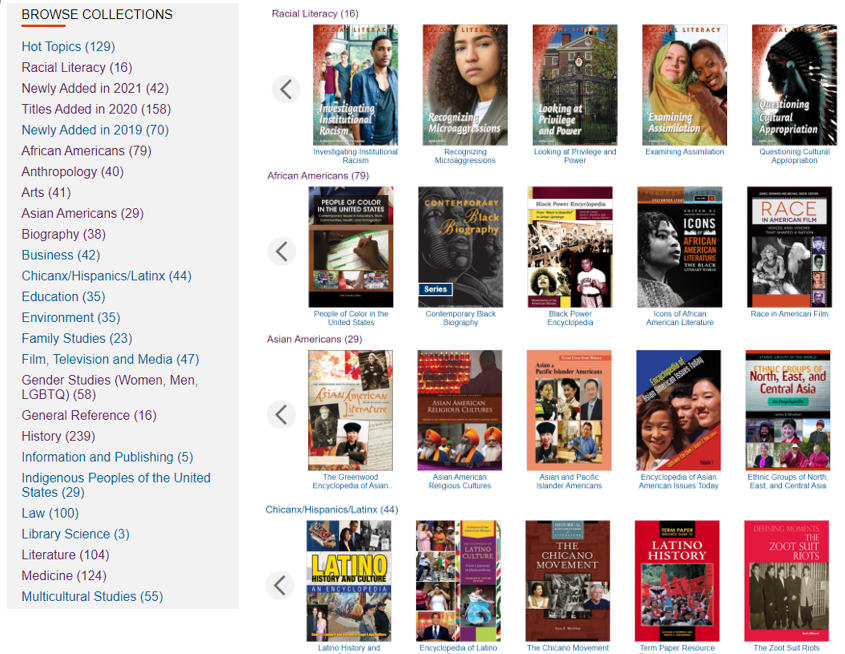DEI and Electronic Resources: What Chabot Has Done the Past Twenty Years
By Norman Buchwald, Chabot College
For the past two decades, Chabot College has made efforts to promote Diversity, Equity, and Inclusion (DEI) through the development of our subscription electronic resources. This has allowed our library to support many themed programs such as Umoja and Puente, as well as a strong number of courses that can satisfy our General Ed American Cultures requirements. In this article I will summarize our efforts and highlight some of the successes and challenges, as well as a timeline of activities that provides an overview of our experience.
Our Experience
As detailed in the timeline below, Chabot Library started strong with what is now known as the ProQuest Diversity Databases (Ethnic NewsWatch, Gender Watch and Alt-Press Watch), but we reinvigorated our DEI electronic resources collection once we were able to order ebooks and reference resources in the 2010s. After the passage of a bond that substantially increased funding for electronic resources, we made a point to add more DEI-themed databases and archival collections. This decision was driven by the results of a survey we gave to faculty and students.
The Chabot Library does not have an established DEI statement in our Collection Development policy (other than that it “reflect[s] the diversity of our students” and that it “support[s] curriculum of current course offerings”). However, we have made efforts to build rich electronic resources in DEI, sometimes with mixed results. Initially, our faculty at large was less receptive to trials of reference databases from ABC-CLIO (e.g. African American Experience, Latino American Experience and American Indian Experience), while there was strong demand for streaming video titles that made Kanopy a necessity. Still, some titles were not obtainable. (The Library only purchases from long standing reliable streaming platforms, and will not lease or perpetually purchase a title from a small nonprofit site that could go under at any time.)
The continual requests from faculty for some type of fully comprehensive Asian American themed full-text database has proven difficult to fulfill. We did have a trial of Gale’s Japanese Internment archives but we found the interface cumbersome and are waiting for the vendor’s promise for a refresh. Alexander Street has full-text plays in its Asian American Drama collection, but that is too specialized for our needs. With the recent demonstrated racism and hate crimes against Asian Americans in the news, I have attempted as a librarian to step up the game by calling on our vendors to provide more DEI titles, but their response is to look at what’s in their general databases. However, such approaches omit important titles like Amerasia Journal. We currently have a trial of EBSCO’s Bibliography of Asian Studies which allows us to filter content and link to what’s in our other databases, much like what we’ve done with our subscriptions to the Chicano Database and Race Relations Abstracts. Unfortunately, the Society for Asian Americans, which maintains the Bib of Asian Studies, rarely includes ISBNs for ebooks, which limits our ability to link to ebooks. We are deeply concerned -- especially while the COVID crisis is still in full swing -- that not having direct links makes the database less useful than it could be. The Library is creating an Ebscohost Discovery Service profile that would include this and our full-text ebook databases as a possible temporary solution.
As for the archives, since they are specialized, usage is not high. Black Studies Center got little attention until the COVID crisis when we experienced a moderate increase in usage. We are wondering if the upcoming new interface might improve things. (If nothing else it can easily be cross searched with our “Watches” ProQuest Diversity Databases.) Arte Publico and Ebony have also shown low usage in contrast to a higher usage rate of the Archives of Sexuality and Gender and Indigenous Peoples: North America. Estimated usage rates are an important consideration before investing in these big archives. Our faculty and students, here at Chabot, seem more interested in ebooks, reference, and journals.
Reflections on Usage
Here are some links to Chabot usage statistics so you can see what our experience has been and which DEI titles have been used most frequently:
- EBSCO Ebooks usage from April 2020 to March 2021. Notice what titles are shaded green. As you can see, a large majority of the resources being used are DEI.
- Gale Ebooks usage from April 2020 to March 2021. A report of Gale ebook usage that contains the reference articles our students consulted the most. Again, DEI titles predominate.
- Our DEI databases usage from April 2020 to March 2021. Usage can be light for individual DEI and archival databases unless an assignment specifically directs students to these sources. Direct full-text also appears to have a plus for our regular databases (notice that activity is higher with the three ProQuest “Watches” and EBSCO’s LGBTQ+). Race Relations Abstracts gets decent usage for its focus (their abstracts provide better retrievals compared to indices like the Chicano Database). Of course, search results and experiences will differ depending on how the student searches the discovery system, either as a whole or via specifically selected databases.
- Kanopy usage from April 2020 to March 2021. Yes, there are definitely challenges in “runaway costs” that can happen with this vendor. But clearly the strong list of DEI related titles that are not obtainable in either AVON or Films on Demand bears some attention.
Timeline
Listed below are examples of what electronic resources we have obtained and promoted through the years:
- 1999-present. Subscription to Ethnic NewsWatch Complete (granted this one went through different vendor interfaces including EBSCO, Softline and ProQuest)
- 2003-present. Subscription to GenderWatch and Alt-PressWatch (then with Softline, now with ProQuest)
- 2009-present. When we started to purchase ebooks the librarians prioritized the selection of titles by and about diverse groups including Latinx, African American, Asian American, Native American, LGBTQ, gender-themed and persons with disabilities. We have also included ebooks of key historic events and periods and additional resources that include diverse viewpoints and individual perspectives.
- 2010-present. We revised our databases page to highlight diversity-themed databases and archives. Prior to the addition of these databases, we relied heavily on ProQuest “Watches” and links to key encyclopedias.
- 2017-present. Library materials budget was strengthened thanks to a facilities bond, allowing the purchase of perpetual collections, some of which focus on diversity themes such as Black Studies Center, Arte Publico Hispanic Historical Archives, Archives of Sexuality and Gender, Indigenous Peoples: North America and the Ebony magazine archive. For the first time we subscribed to individual electronic journals, such as Contexts, Amerasia Journal and Aztlan (the latter two are not available in aggregators and we selected the first for classes that wanted students to read current issues).
- 2018-present. The Library continued to expand its subscription databases based on the responses from a college-wide survey of faculty for a number of trials. Additions include two non-full text databases -- Race Relations Abstracts (voted #1 on the survey) and the Chicano Database -- and one full-text resource, LGBTQ+ Source, which the Library is now getting through its subscription to the EBSCO 17 package. Usage of the first two, especially, shows that even if not a full-text database (but with link resolver capability when full-text is available elsewhere) usage was decent. In response to this success, we have trials to two other non-full text databases: Bibliography of Native North Americans and Bibliography of Asian Studies.
- 2018-2020. Not every DEI resource that the Library adds gets spectacular usage. Despite enthusiasm from the World Languages program, our subscription to the 100% Spanish database Referencia Latina was a bust. Likewise, despite promotion from DSPS and a faculty member who provides an assignment to students to find resources on Deaf Culture, the Alexander Street database Disability in the Modern World was also hardly ever used. The Library reluctantly discontinued these resources.
- 2019-present. With Gale Ebooks providing the ability for the Library to create its own categories, the Library decided to do more than just lead to Gale’s minimal multicultural category. Our diversity databases page has the categories listed and students can do a filtered search of ebooks grouped in topics such as Asian Americans and Indigenous Peoples of the United States.
- Summer of 2020. When Black Lives Matter protests were on the rise in response to the tragedies of Breonna Taylor and George Floyd, the Library was ready to promote its resources, including the Racial Literacy ebook series we purchased in late 2019. We provided a link directly into our Gale Ebooks platform, and instructions on how to find additional resources related to civil rights, police misconduct, and protests. Summer school faculty were already providing permalinks to key ebooks and databases within days of our announcement.
- 2020 to present. With the Library becoming 100% virtual and faculty requesting more DEI resources, our Collection Development Librarian obtained more licenses certain titles that otherwise would have turnaways. For the first time ever since I wrote my Gale “suppressed titles” articles back in 2010 and 2016, we ordered a few Greenhaven titles. The online titles may lack certain content, but the what is not suppressed is now available for our students during the COVID crisis.


Our good fortune is that since 2006 we have had a steady materials budget that got even more robust in 2017 thanks to the passage of capital bonds in 2004 and 2016. However, we have noticed some ways we might save money on the titles we do order. For example, the ABC-CLIO/Greenwood/Praeger publishing group appears to have multiple titles that can duplicate information. We would strongly recommend that the librarian in charge of collection development preview these titles. When evaluating interfaces, we usually favor Gale Ebooks since they can then be retrieved at the chapter/entry level. EBSCO and ProQuest have preview capabilities on their ebook ordering platforms. You can also request a Gale Ebooks trial.
Conclusion
Chabot Library’s efforts to include DEI in our online collection development helps fulfill the current calls for libraries to have a strong DEI presence. Still, there is always room for improvement. If a vendor would finally provide a comprehensive full-text database of Asian Americans that would help. We can also highlight such resources in other databases. Regardless, we hope that sharing our experience might be useful for those looking to strengthen their DEI offerings. We are still far from perfect and we can learn from what other institutions are doing. DEI resources are an essential research component that expands students’ knowledge-base, providing content that touches on the variety and vibrancy of humanity, addresses overlooked, often dark chapters from history, and builds an understanding of the various peoples in our country and the world.